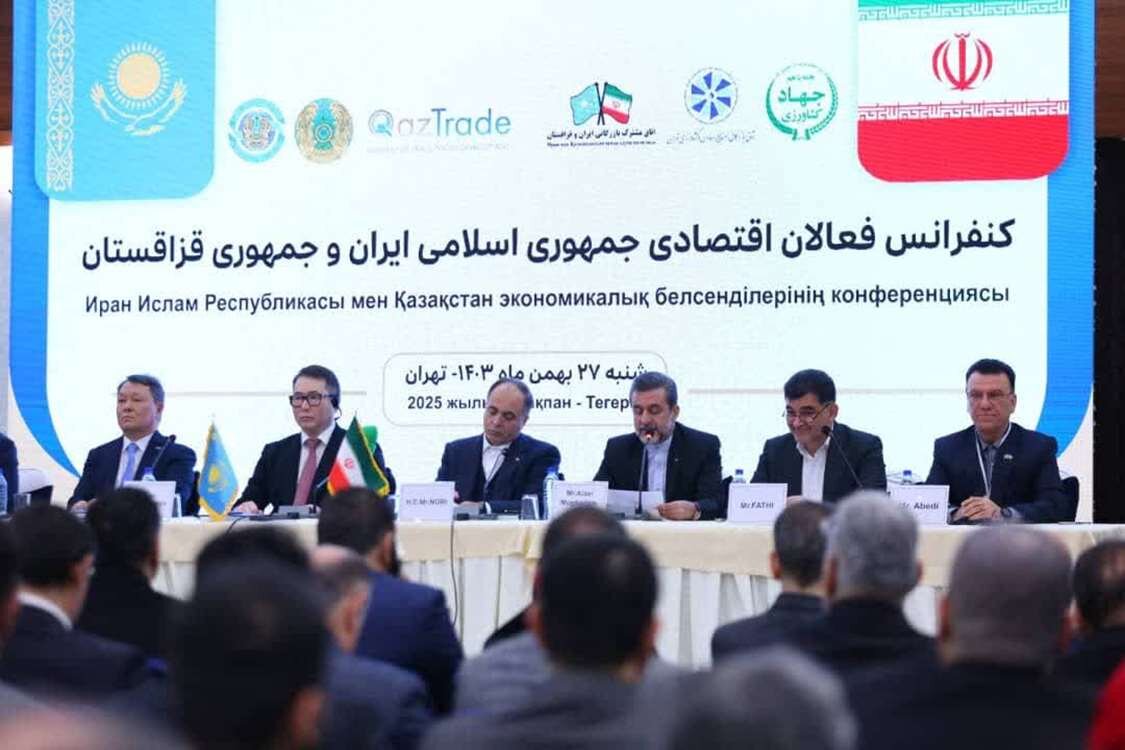Iran, Kazakhstan strengthen trade ties, aim for $3b in exchanges

TEHRAN - Iran and Kazakhstan have reaffirmed their commitment to expanding economic and trade relations, with both countries aiming to increase bilateral trade to $3.0 billion.
During a business forum in Tehran attended by Iranian Agriculture Minister Gholamreza Nouri Ghezeljeh and Kazakh Trade and Integration Minister Arman Shakkaliyev, officials and private sector representatives discussed economic cooperation.
Nouri emphasized that while Iran and Kazakhstan have made continuous efforts to enhance political, economic, and cultural ties, their collaboration still falls short of its full potential.
He highlighted the importance of bilateral trade in sectors such as agriculture, mining, tourism, and industry, noting that Iran’s strategic position in West Asia and Kazakhstan’s role in Central Asia create exceptional opportunities for businesses.
He also stressed the need for stronger trade infrastructure, enhanced transport links, and supportive policies to facilitate sustainable economic growth.
Nouri pointed to the roadmap agreement signed between the two governments, which sets a $3.0 billion trade target, as a sign of their serious commitment to expanding ties.
He also underscored the importance of addressing banking and trade regulations, resolving quarantine issues related to livestock and plant products, and fostering mutual trust to support commercial exchanges.
Also during the forum, Shahpour Alaei-Moghaddam, Iran’s deputy minister of agriculture, described the growing trade between Iran and Kazakhstan as a reflection of Tehran’s broader regional engagement strategy.
He noted that bilateral trade reached $302 million in the first 11 months of 2024, marking an 8.1 percent increase compared to the previous year.
He also pointed to the formation of joint agricultural committees, trade agreements, and research collaborations as key tools in strengthening economic ties.
Tehran, Astana to boost trade under EAEU agreement
During his visit to Tehran, Shakkaliyev also met with Iran’s Minister of Industry, Mining, and Trade Mohammad Atabak in which Atabak also reiterated that that Tehran and Astana aim to increase their economic and trade exchanges to $3.0 billion, in line with agreements reached by the leaders of both countries.
He emphasized that the Eurasian Economic Union (EAEU) trade agreement would facilitate interbank transactions between Iranian and Kazakh traders.
In the meeting, which was also attended by the Kazakh ambassador to Tehran, and an accompanying economic and trade delegation, Atabak noted that despite the long-standing economic and commercial ties between Iran and Kazakhstan, the current trade volume does not reflect the full potential of their relationship.
Atabak highlighted that senior officials from both countries are committed to expanding trade in line with their industrial and economic capabilities, stating that achieving a $3.0 billion trade volume is within reach.
He pointed out that banking obstacles remain a major challenge in bilateral trade, but under the EAEU agreement, these barriers are expected to be removed.
The official emphasized Iran’s extensive mineral resources, stating that Iran can supply all types of metallic and non-metallic minerals required by Astana. He also noted that barter trade could be an option based on mutual needs.
He also highlighted Iran’s expertise in various fields, including technical and engineering services, and expressed interest in expanding knowledge exchange and cooperation in these sectors.
He stressed the importance of logistics and railway transport in boosting trade volume between the two countries.
Atabak welcomed the prospect of mutual food exports and underscored the need to meet agreed-upon standards.
He concluded by announcing the formation of a working group to operationalize areas of cooperation at the expert level, assigning specialized deputy ministers from the Industry, Mining, and Trade Ministry to oversee various aspects of Iran-Kazakhstan collaboration.
Challenges in banking and transport hinder trade growth
In a separate meeting, Iranian Chamber of Commerce Head Samad Hassanzadeh stressed that trade volume between the two countries does not reflect their full industrial and commercial potential.
He noted that Iran currently imports agricultural products and semi-assembled engines from Kazakhstan, while Iran has strong export potential in food industries, petrochemicals, engineering services, and construction projects.
Hassanzadeh called for the swift implementation of previous trade agreements, pointing out that many signed memorandums have not been effectively put into practice.
He also suggested expanding tourism and academic exchanges, including student scholarships, to deepen bilateral cooperation.
He emphasized that overcoming logistical and banking hurdles would be essential to reaching the $3 billion trade target.
Amir Abedi, head of the Iran-Kazakhstan Joint Chamber of Commerce, identified financial transactions as the main barrier to trade expansion, urging both governments to facilitate banking operations and ensure Iranian businesses can operate smoothly in Kazakhstan.
Meanwhile, Amir Yousefi, head of the Gorgan Chamber of Commerce, noted that around 7,000 ethnic Kazakhs reside in Iran’s Golestan province and suggested greater Kazakh investment in the Incheh-Borun Free Trade Zone.
Shakkaliyev, for his part, reiterated his country's commitment to increasing trade volume, highlighting a delegation of over 50 Kazakh companies from 14 provinces that attended the Tehran forum.
He identified construction materials, medical equipment, machinery, and food industries as key areas for boosting bilateral trade, suggesting that engineering services alone could add $500 million to annual trade.
He stressed that banking issues must be resolved to facilitate higher trade volumes and said Kazakhstan has proposed solutions to improve financial cooperation.
He also underscored the importance of transportation infrastructure, calling for better utilization of the International North-South Transit Corridor to streamline logistics.
As a step toward deeper economic integration, Shakkaliyev proposed launching ten large-scale joint industrial projects, with implementation plans to be finalized in an upcoming Iran-Kazakhstan Economic Committee meeting in April.
EF/MA
Leave a Comment